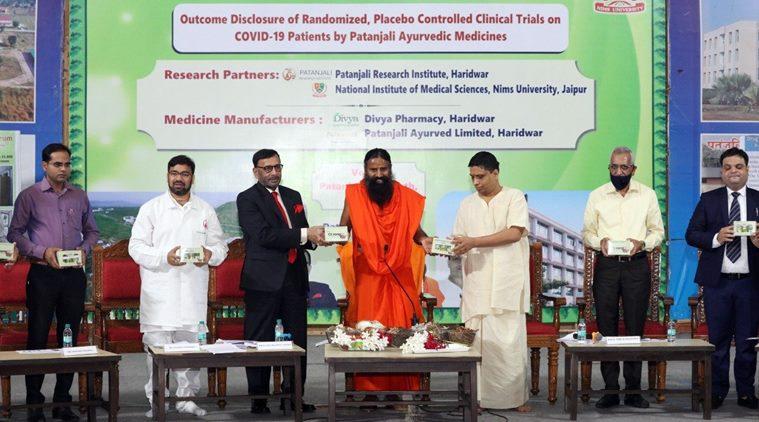COVID-19 ‘Medicine’: Patanjali Needs to Answer Some Tough Questions

Image Courtesy: Indian Express
While the entire world is grappling with COVID-19 and scientists are striving to develop effective drugs and a vaccine, Patanjali Ayurveda, came out with tall claims and a package of Ayurvedic drugs “found to be 100% effective” in treating the disease on June 23.
The kit contains ‘Coronil’ and ‘Swasari Vati’ in the form of tablets, and ‘Anu oil’. Co-founder Ramdev said that more than 100 compounds have been used in producing the medicine and it will boost immunity. It was further claimed that the medicines have undergone two-stage trials with COVID-19 patients. The first trial, reportedly, was a clinical control trial conducted in Delhi, Ahmedabad and some other cities. In this, the 280 patients that were recruited “showed 100% recovery”.
Patanjali also claimed that ‘Coronil’ and ‘Swasari Vati’, when administered for three days, showed 69% recovery in COVID-19 patients and when administered for seven days, showed 100% recovery.
Meanwhile, the AYUSH Ministry has ordered the company to stop advertising the products until the claims are properly verified. Shripad Naik, the AYUSH minister, was quoted to have said, “It’s a good thing that Baba Ramdev has given a new medicine to the country, but as per rules, it has to come to the AYUSH Ministry first.”
In this context, several questions and points need to be raised to examine the claims by Patanjali.
-
The number of patients who participated in the trial [280] is not statistically significant. We don’t know about the severity of the symptoms that these patients were showing. In many milder cases of infection, patients have recovered without much aid or medication. In this case, it can not be said firmly that it was the Patanjali medicines that cured the patients.
-
Secondly, the National Institute of Medical Research (NIMR), Jaipur, where the trials were conducted, is a private institute established in 2009. A report in Down to Earth says that the institute’s history does not say anything decisively about its prior experience in conducting drug trials. The institute, including for the trial of the Patanjali medicine, has only registered twice with the CTRI (Clinical Trials Registry of India) for drug trials. The other trial has also been registered in June 2020 itself.
-
Patanjali says that the medicines have commonly used herbs like Tulsi, Ashwagandha, Giloy in it. These are very common ingredients used in many ayurvedic medicines and are generally believed to be effective in boosting immunity. But if there are any specific ingredients to fight against the viral disease is not known.
In scientific endeavours across the world, the primary object in developing a drug is either to stop the viral replication of SARS-CoV-2 inside the human cell or to inactivate the virus before it can enter the host cell. In this context, the spike protein plays a crucial role. It is the protein that can bind to specific receptors called the ACE 2, readily available in human cells. One effort is to produce a drug agent that can interfere with the spike protein so that the virus fails to cling on to the cell receptor to enter human cells. The common ayurvedic components have no scientific validation in this regard. Nor do these have it when it comes to stopping the viral replication inside the cell. What specific component in Patanjali’s medicines can counter the attack of the virus is not known. And whether they are validated with rigorous research is also not known.
A claim to attain a 100% recovery with the help of these medicines is likely to create more confusion when millions are suffering and millions are panicking about the possibility of infection by the notorious virus.
-
Till now, hundreds of drug trials have been conducted worldwide, but as per WHO, there is presently no drug that can cure or prevent COVID-19. There are multiple efforts underway to produce a vaccine against the virus causing COVID-19. But nothing is conclusive as of now. There are also apprehensions about the possibility of producing a vaccine, as the SARS-CoV-2 virus is an RNA virus and undergoes quick mutations. Experience with some other RNA viruses like HIV, Ebola, etc. has not been very promising. We don’t have any vaccine against these, nor do we have against the even milder influenza virus. Still, the world’s scientific community is struggling to have effective drug agents against many of these viruses. In such a situation, coming out with advertisements and tall claims the way Patanjali did is a serious issue.
The first thing that Patanjali could have done was to specify the components and verifying their effectiveness, if any, against COVID-19. Then, the components should have been used in the form of medicine, which is severely lacking on their part.
Before giving a green signal to Patanjali medicines, the components will have to be subjected to rigorous scientific research.
Get the latest reports & analysis with people's perspective on Protests, movements & deep analytical videos, discussions of the current affairs in your Telegram app. Subscribe to NewsClick's Telegram channel & get Real-Time updates on stories, as they get published on our website.
























